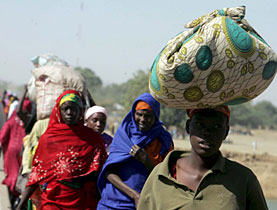Swiss acknowledge Vietnam’s potential

President Pascal Couchepin has praised Vietnam's potential for economic growth and described bilateral and economic relations with the Asian country as excellent.
He held talks with his Vietnamese counterpart, Nguyen Minh Triet, as well as government ministers and members of the ruling Communist Party during his three-day visit to the capital, Hanoi, and Ho Chi Minh City.
On Tuesday, Couchepin, who as interior minister is in charge of education and research, witnessed the signing of cooperation agreements between Ho Chi Minh City Polytechnic and the Federal Institute of Technology in Lausanne, and between Hanoi and Geneva universities.
“The aim of the agreement is to boost cooperation in education, notably training in information technology between Switzerland and Vietnam,” said Couchepin’s spokesman.
The accord foresees an exchange of Vietnamese students and Swiss professors, due to begin later this year.
Couchepin also held talks with Vietnam’s education minister, Nguyen Thien Nhan, to discuss cooperation in the finance, banking and tourism sectors.
On Monday, Couchepin met the Vietnamese president, Nguyen Minh Triet, the prime minister, Nguyen Tan Dung, as well as the secretary-general of the Communist Party, Nong Duc Manh.
A free trade agreement between the two countries is desirable in the medium term, Couchepin said.
Dynamic economy
Vietnam has a particularly dynamic economy, with an average economic growth of seven to eight per cent each year. At the end of 2007 the average annual wage was $800 (SFr840) per capita.
“The added value of science and technology to the Vietnamese economy needs to be improved. Switzerland has always been present during the various stages of Vietnam’s economic development and in Vietnam’s fight for independence,” he added.
Vietnam is currently undergoing a period of high inflation, but both Couchepin and Triet said they were confident that the country would overcome its problems.
Couchepin pointed to the “impressive rise” in the volume of foreign investment in the country in the first months of 2008 as a sign of this.
The future
Vietnam is a member of The Next 11, a group of countries identified as having a potential for economic development and growth, along the lines of that generated by China and India.
Couchepin said Vietnam, with a young population – 20 per cent are younger than 30 years old – had much to offer.
But he also raised concerns about the effects of global warming on the Mekong Delta, in the southwest of the country, which is key to the economy as a rice producer. It is also home to almost 20 million people in a country of 84 million. There are fears that the waters could rise.
“Vietnam remains a country of the future. It has the potential for extraordinary growth which merits the interest of private investors,” the Swiss president declared.
However, it’s still necessary to maintain the level of development aid, in particular to deal with the results of climate change.”
swissinfo, Andrea Arcidiacono in Hanoi and agencies
Pascal Couchepin is Swiss interior minister and in charge of education and research a well as health, culture and social security.
Couchepin this year also holds the rotating post of Swiss President.
During his ten-day trip to Asia Couchepin will also attend the opening ceremony of the Summer Olympics in Beijing on August 8 before travelling to the Philippines.
Switzerland has more than 50 investment projects in Vietnam with a total investment capital of $720 million.
Among the Swiss companies active in Vietnam are cement producer Holcim and food giant Nestlé.
Last year trade between two countries was SFr498 million. Exports to Switzerland were worth SFr259 million against imported goods worth SFr239 million from Switzerland.
The main Swiss export products were machinery as well as chemicals and pharmaceuticals.
Imports from Vietnam included agricultural products, shoes and textiles.

In compliance with the JTI standards
More: SWI swissinfo.ch certified by the Journalism Trust Initiative










You can find an overview of ongoing debates with our journalists here . Please join us!
If you want to start a conversation about a topic raised in this article or want to report factual errors, email us at english@swissinfo.ch.